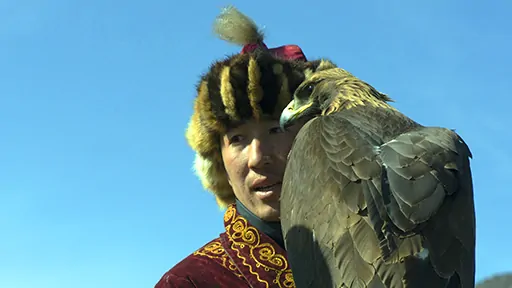Opinion Editorial Archive September, 2018: Extraordinary Ability

The man in this month's photo is a citizen of Mongolia: That demographic defines him as Mongolian. But he isn't ethno-linguistically Mongol: That demographic defines him as Kazakh. He speaks and understands both Kazakh and Mongolian fluently: That demographic defines him as bi-lingual. His genome has never been sequenced. But I know that it contains Neanderthal and Denisovan DNA: That demographic defines him as the outcome of millions of years of hominin evolution.
Last month, the research results were published of the genomic sequencing of a young girl who once lived in the same part of the world where I took this photo. She is the first scientifically proven offspring of reproduction between archaic, migrating human species: Neanderthals and Denisovans. Had she been immortal she would now be celebrating her fifty-thousandth birthday. Despite her mortality, though, the genetic advantages she inherited from her hybrid birth made her a person of extraordinary ability.
Last month, we saw Nicaraguans migrating to Costa Rica to seek citizenship. We saw the same in the case of Venezuelans migrating to Brazil, Colombia, Ecuador and Peru. In the case of Burma (Myanmar), from where Rohingya people have been migrating en masse for a year now, the United Nations published, just a few days ago, its most damming report yet. It accuses senior Burmese military of genocide, crimes against humanity and war crimes — terms the UN does not use lightly.
Many of the world's forced migrants are indigenous people, and many of those are stateless. (The UN reported last year that over 75% of the world's stateless people are indigenous people.) This is often because their own government does not recognize them as legal citizens of the country in which they were born. That is the case in one of Burma's neighbors that is also run by the military, Thailand.
Two months ago, the worldwide media focused heavily on the rescue from a cave of a trapped football team of schoolboys in northern Thailand. But a follow-up story from last month got less media attention. Three of those rescued boys — Adul Sam-on, Mongkol Boonpiam and Pornchai Khamluang — received Thai citizenship on August 8 — a day before Indigenous Peoples' Day. They are ethno-linguistically Shan whose parents were migrants forced from Burma. Their new citizenship status gives them the human rights that they should have enjoyed from birth — including freedom of movement, legal employment and citizenship for their own children.
Their coach, Ekkapol Chantawong (who was also born in Thailand and received Thai citizenship on the same day), said "... football can elevate the lives of kids whose families may not be in the best position." While that is true of football players of extraordinary ability, it is, sadly, only ironically true of these boys.
Last month I saw Spike Lee's latest film, BlacKKKlansman. In my opinion, Lee is a person of extraordinary ability. His includes the ability to tell the stories of people of extraordinary ability. His film starkly reminds us that there are many in his country who would be denied citizenship and human rights had recent history played out differently. More importantly, it reminds us that this same history is still being played out all over the world.
The man in this month's photo has extraordinary ability. I witnessed it when I saw him demonstrate his mastery of eagle hunting. But he did not need to have that ability to be a Mongolian citizen. His government recognizes that right because he was born there. When the Neanderthal/Denisovan hybrid girl was born close to where he was born there was no such thing as statelessness.
The Altai Kazakh people are the subject of our documentary, The Last Kazakh Nomads of Mongolia.
If you enjoyed reading this month's opinion editorial, please consider supporting independent, advertising-free journalism by buying us a coffee to help us cover the cost of hosting our web site. Please click on the link or scan the QR code. Thanks!

